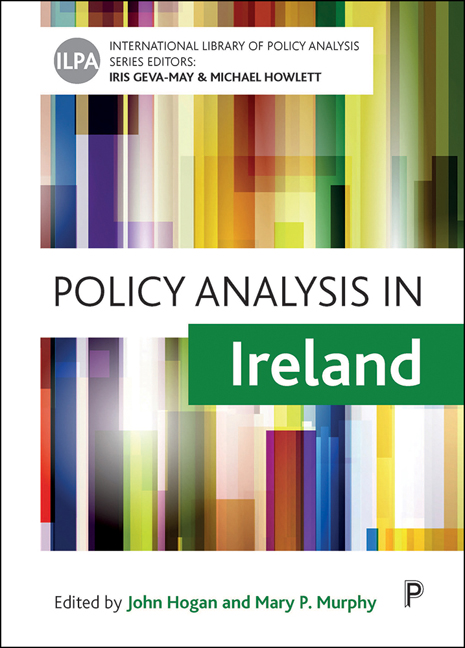Book contents
- Frontmatter
- Contents
- List of figures, tables and boxes
- List of abbreviations
- Notes on contributors
- Editors’ introduction to the series
- Acknowledgements
- Foreword
- Preface
- one Contextualising policy analysis in Ireland
- Part One: History, styles and methods of policy analysis in Ireland
- Part Two: Policy analysis at various levels of government: from local to the EU
- Part Three: Think tanks, interest groups, political parties and gender-based policy analysis
- Part Four: The public, science and the media: the wider policy analysis environment in Ireland
- Index
seventeen - Media discourses on the economy in Ireland: framing the policy possibilities
Published online by Cambridge University Press: 18 December 2021
- Frontmatter
- Contents
- List of figures, tables and boxes
- List of abbreviations
- Notes on contributors
- Editors’ introduction to the series
- Acknowledgements
- Foreword
- Preface
- one Contextualising policy analysis in Ireland
- Part One: History, styles and methods of policy analysis in Ireland
- Part Two: Policy analysis at various levels of government: from local to the EU
- Part Three: Think tanks, interest groups, political parties and gender-based policy analysis
- Part Four: The public, science and the media: the wider policy analysis environment in Ireland
- Index
Summary
Introduction
Ireland suffered a lot economically in the Great Recession following the 2008 global financial crisis, yet its policies continued on a neoliberal trajectory, making Irish neoliberalism less a Zombie and more like a reinvigorated Frankenstein's monster, with ordoliberal transplants from Germany grafted on to an Anglo-American neoliberal composite body. Yet, along with these continuities came much change. There was political change in party strengths and personnel. There was change in the Irish state's capacity for policy analysis (MacCarthaigh, 2017), an increase in the number of policy analysts and their specialisms, and an increased stress on evidence-based policy making (see Chapters Four and Eight, this volume). How can a discursive approach help explain these continuities and changes in policy making? Perhaps, more importantly, how do we respond to make Irish policy discourse better?
This chapter first argues that a discursive approach can add much to our understanding of what has been happening in policy analysis in Ireland. The concept of hyper-specialisation is then introduced as it is both an important feature of the context in which policy discourse takes place, and because it shows the complexities of what discourses face as they travel across societies. Next, the chapter examines policy-relevant discourses of media and actors within the media, and unpacks recent developments to ascertain what they mean for Irish public policy discourse. It then examines how internationalisation affects such policy discourses and the impact of that complication on participation in policy debates. Further complexities are introduced in the following section, which considers the effects of technocratisation, and particularly economisation, on how policy is discussed. The final section of the chapter draws some conclusions from the earlier exploration of the rather daunting features of our policy discourses.
A more discursive view: beyond pure ideas to interactions and material affordances
Along with individuals, interests and institutions, ideas have long been understood as important in shaping policy. Studies informed by discursive institutionalism (Schmidt, 2008) on the discourse of social science experts and analysis of media coverage of the economy (Rieder and Theine, 2019) make clear that such ideas do not enter the policy arena as individually considered and evaluated atomic units. Such work has shown that the view of ideas being mixed and matched until the best possible outcome emerges from a well-functioning marketplace of ideas is just not how this process works.
- Type
- Chapter
- Information
- Policy Analysis in Ireland , pp. 249 - 262Publisher: Bristol University PressPrint publication year: 2021



